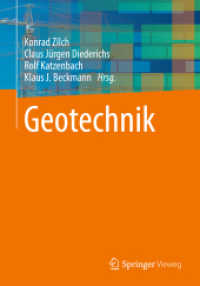- ホーム
- > 洋書
- > ドイツ書
- > Social Sciences, Jurisprudence & Economy
- > Politics, Society, Work
- > political science
Full Description
This study transcends the homogenizing (inter-)national level of argumentation ('rich' versus 'poor' countries), and instead looks at a sub-national level in two respects: (1) geographically it focuses on the rapidly growing megacity of Hyderabad; (2) in socio-economic terms the urban population is disaggregated by taking a lifestyle typology approach. For the first time, the lifestyle concept - traditionally being used in affluent consumer societies - is applied to a dynamically transforming and socially heterogeneous urban society. Methodically, the author includes India-specific value orientations as well as social practices as markers of social structural differentiation. The study identifies differentials of lifestyle-induced GHG emissions (carbon footprints) and underlines the ambiguity of a purely income based differentiation with regard to the levels of contribution to the climate problem.
Contents
Chapter1. Introduction: Climate change and lifestyle - the relevance of new concepts for socialecological research.- Chapter2. Approaches of measuring human impacts on climate change.- Chapter3. The research context: India and the megacity of Hyderabad.- Chapter4. Conceptualisation and operationalisation - A social geography of climate change: Social-cultural mentalities, lifestyle, and related GHG emission effects in Indian cities.- Chapter5. Results part I - Descriptive analysis of manifest variables and preparation of latent components for the lifestyle analysis.- Chapter6. Results part II - Income, practice, and lifestyle-oriented analysis of personal-level GHG emissions.- Chapter7. Discussion.- Chapter8. Final conclusions - Understanding inequalities in consumption-based, personal level GHG emissions.








